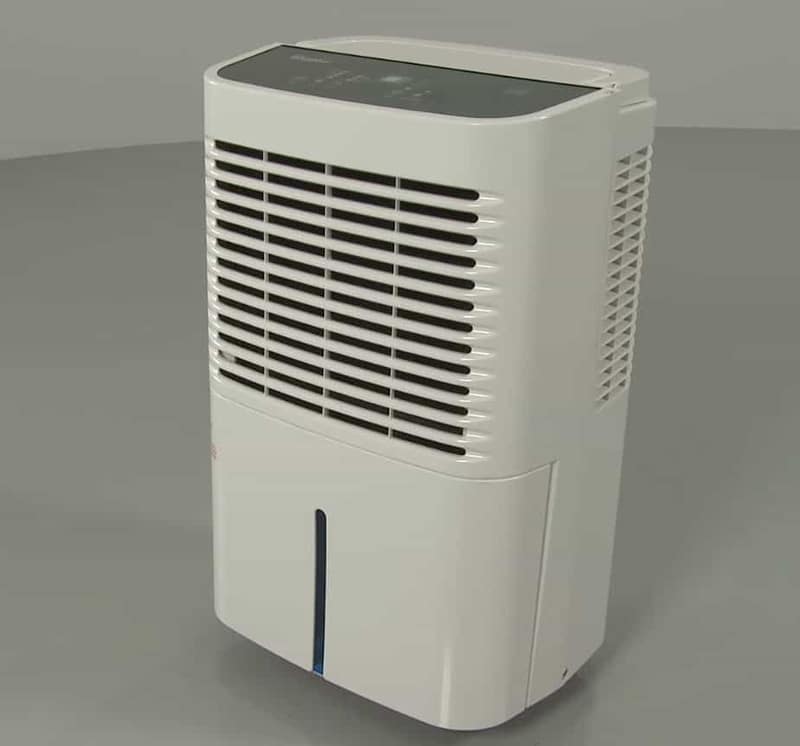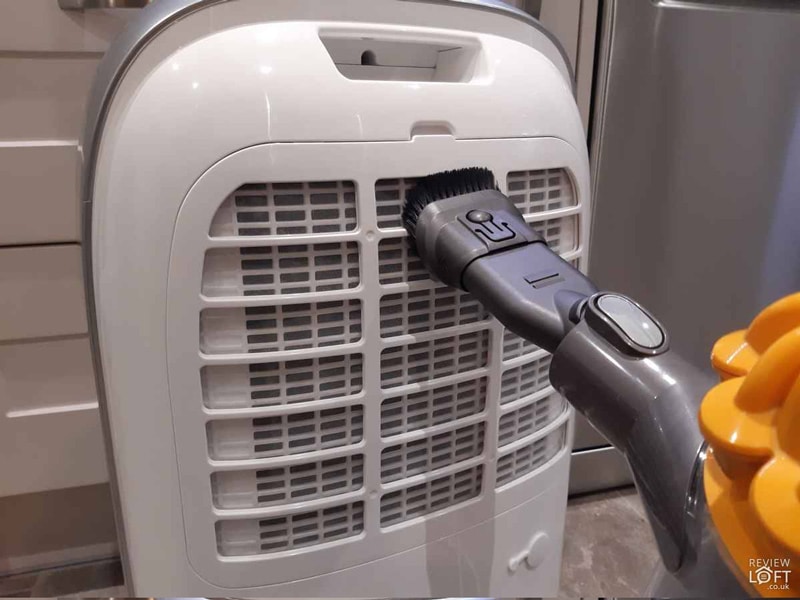Do you have a noisy dehumidifier? Something inside it might be loose. Here’s how to make it quieter.
It’s undeniable that dehumidifiers provide us with a world of options, and convenience.
Whether you own yours to prevent the formation of mold, or simply because you hate the smell of humidity in your home, you’ll agree with me on the fact that it has changed your life.
And while there’s a certain learning curve when it comes to operating them, and setting them to the right levels, these appliances are, for the most part, very easy to use.
How we managed to live without them in the past, is beyond me.
That being said, what happens when your beloved machine starts making intolerable amounts of noise? If you’re here, you know exactly what I mean, and you’ve probably been experiencing this issue for a while.
Is there anything you can do to restore the peace and quiet in your home? Of course!
Below, I’ve prepared a list with the most common causes to this occurrence, and the simplest steps you can take to address them. Rest assured that, by the end of it, your dehumidifier will be back to its quiet self.
Are you ready? Let’s go!
Fixing a Noisy Dehumidifier
Many of the potential causes to this problem are related to a faulty internal component. But improper cleaning, and maintenance could also play a very important role in the situation.
Before prying your appliance open, and start testing its internal parts for viability, it’s critical that we check your filters, and any other part responsible for adequate airflow. Failing to go about this in a detailed and orderly way, is the quickest path to wasting precious resources, and damaging the machine further.
#1 Improper Component Placing
Something might be loose inside your unit
If you’re in the habit of cleaning your dehumidifier often, good for you, you’re doing everything you can to extend its lifespan. However, even with best practices come certain dangers.
While making sure to clean or replace your air filters, and give your internal components a good wiping now and then is strongly recommended, putting everything back together properly is also essential, as you could create some problems otherwise.
If you have a noisy dehumidifier, there’s a very good chance that something might be loose inside it that’s coming into contact with other parts in the unit.
Solution: I know it’s annoying, but you’re going to have to disassemble your dehumidifier again, and double-check everything’s sitting tightly.

#2 Lower Your Settings
Adjust your settings for quieter operation
Are you still hearing noises after reassembling your appliance? We can safely move on to the possibility of an error on your end, then.
Sometimes, certain dehumidifier models are just noisy by design, but we don’t hear them during the day because of our daily activities.
If this is your case, the noise would become much more noticeable at night, when everything’s quieter, and you’re paying more attention to it. Before immediately assuming that there’s something wrong with your appliance, you should check your fan settings.
It’s very common that people set the machine to run extremely fast, thus creating a loud noise.
Solution: Not much to do here, just try to read your user manual again. Unless you’re running your appliance in a very large room, there’s a very good chance that your settings are too high for your dehumidifying needs.
#3 Replace the Compressor
If you own a model with a pump, you’ve probably wondered how your appliance goes about getting rid of the excess water in the reservoir, right?
The answer is very simple. By using its compressor.
This component is solely responsible for transporting water across your unit and pumping the excess out of it. You can think of it as the heart in a human body, pumping the blood through the veins and arteries.
To do this successfully, your compressor exerts enormous amounts of pressure, which results in water moving through the tubes. When it becomes clogged or otherwise damaged, it can start making loud noises.
If your dehumidifier is noisy, there is a very good chance that you might have to replace this component.
If you want to get any replacement part – or see how much one would cost – click to enter your model number in the search bar below. Our partners at AppliancePartsPros stock almost every part with free guides on how to install them.

Solution: You’ll have to go in by disassembling your appliance. Your compressor should be located next to the reservoir, but this can vary from model to model. Your best bet is to check your user manual, as you’ll likely find detailed instructions on how to access your machine’s internal components in there.
That being said, the broad strokes should be similar for most units. If you’re a visual person like me, there are tons of online videos you can check out, and follow along step by step to get a clearer idea of the process.
#4 Clean the Fan Bearing
The fan bearing might need an urgent cleaning session
While household appliances are designed to make our lives easier, this doesn’t mean that we can neglect them altogether. As independent as a machine may be, its components will always need our attention from time to time.
And fan bearings are not the exception.
As you know, this part is responsible for allowing your fan blades to spin around their own axis, and suck in the humid air from your room, and into your dehumidifier. When the bearing has not been sufficiently oiled, it can start grinding against other metal pieces, thus causing all sorts of noises.
If your dehumidifier is being noisy, you might want to check your oil levels, as it’s very likely that this part needs to be topped up.
Solution: Carefully disassemble your dehumidifier and gain comfortable access to the fan bearing.
You should be able to spot an oil intake in it, where you can pour in the lubricant.
The recommended refilling time can vary greatly from model to model, and depending on the frequency of use of the appliance. However, as a general rule, making sure to top up the part every couple of years, is a good idea.
#5 Clean the Filter
Proper maintenance of your appliance can go a long way
A lot of people are surprised when they find out that their dehumidifiers have air filters, but there’s a very good reason for this design.
You see, as your appliance operates, it sucks in the humid air from your room, collects the excessive moisture in the reservoir, and then releases a drier current back into the environment.
This process would be impossible without your fan. But what stops debris and other pollutants from reaching your machine’s internal components?
The filter, of course.
This part is the shield between the outside world and your dehumidifier. Any obstruction from dirt can make the fan have to work faster to suck in the air adequately, thus causing the loud noise.
Solution: Carefully unplug your dehumidifier, and let it cool down. Once a couple of minutes have passed, you can detach the front panel, and remove the filter.
Should it just need cleaning, you can scrub it with dish soap under running water, let it dry completely, and then vacuum off any remaining debris.
Now, this will only work with filters that are newer than 6 months, so, if yours is older than that, no amount of cleaning will make it work normally again, and you’ll need to replace it.
Bummer, I know.

#6 Relocate the Appliance
Placing your unit behind a padded object could make a night and day difference
If everything seems fine, it’s not too crazy to think that you simply own an extremely noisy model.
Now, this does not mean that you’re stuck with the intolerable noise forever, though. There are some things you can try, even in this scenario.
Solution: If possible, try to place your appliance behind a big padded surface, such as a large sofa. I won’t bore you with the technical details, but padded surfaces are great at absorbing sound waves.
This is why the walls at recording studios are always padded, and why clapping in an empty room is much louder, and full of echo, than doing so in one with furniture.
And yes, by doing this you might be sacrificing a little dehumidifying efficiency, but it’s worth it to get rid of the noise.
When Should You Consider a Replacement?
This will depend greatly on your warranty status, and whether the solutions above worked for you.
If you’re still under coverage and don’t mind waiting a couple of days or weeks to have your manufacturer send a technician to your home, by all means, call them. Unless specified otherwise, they should take care of the repairs for free.
Alternatively, if your warranty has expired, you’ll have to weigh the cost of repairs vs the cost of a new model.
If you want to get any replacement part – or see how much one would cost – click to enter your model number in the search bar below. Our partners at AppliancePartsPros stock almost every part with free guides on how to install them.

Conclusion
To have your dehumidifier make excessive amounts of noise can be nerve wracking. Especially when you’re trying to have a good night’s sleep or make an important phone call.
Fortunately, as I hope you’ve learned in this piece, addressing most of the causes behind this issue is fairly simple, and not very time-consuming.
More often than not, placing your components adequately, and making sure to clean your filter regularly is more than enough to prevent this from happening again.
Thank you for reading. If you found this article helpful, why not become an expert in this subject through our other incredible resources below?
Happy projects!







